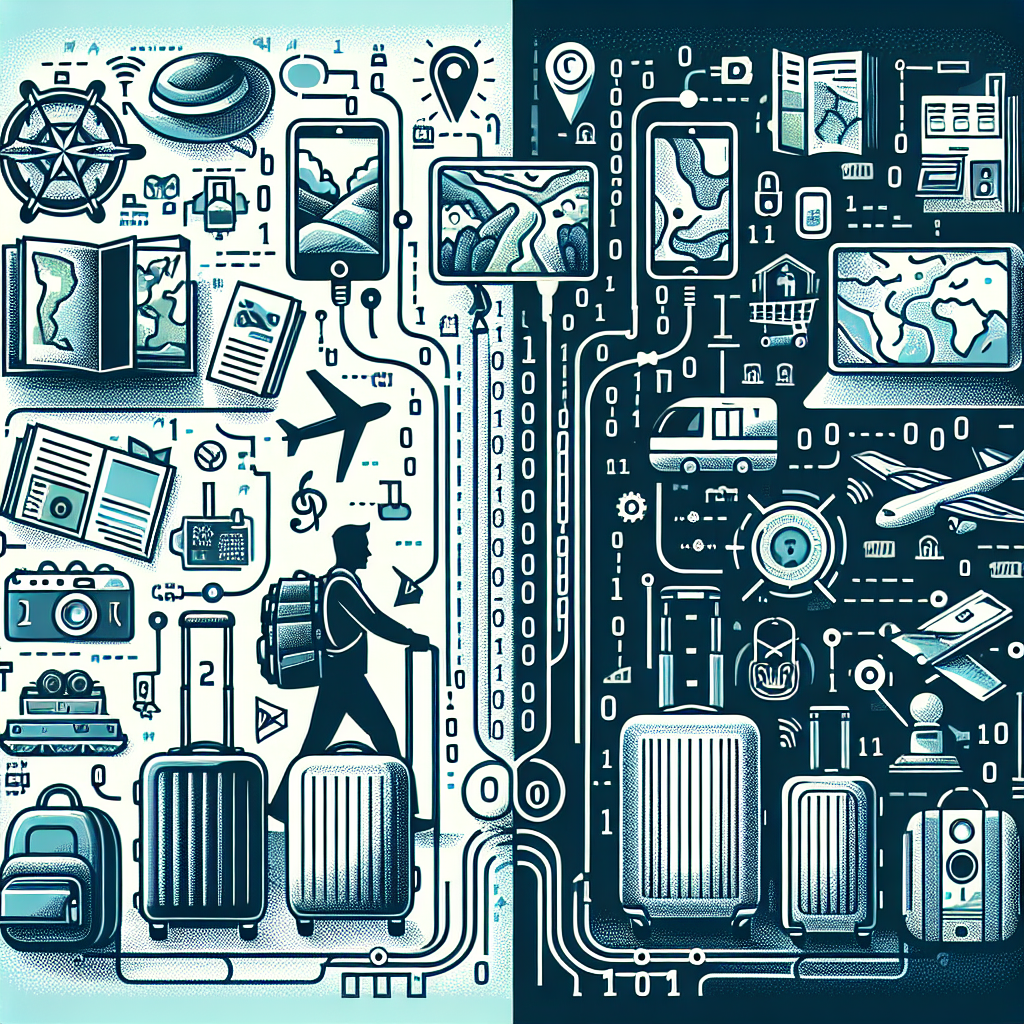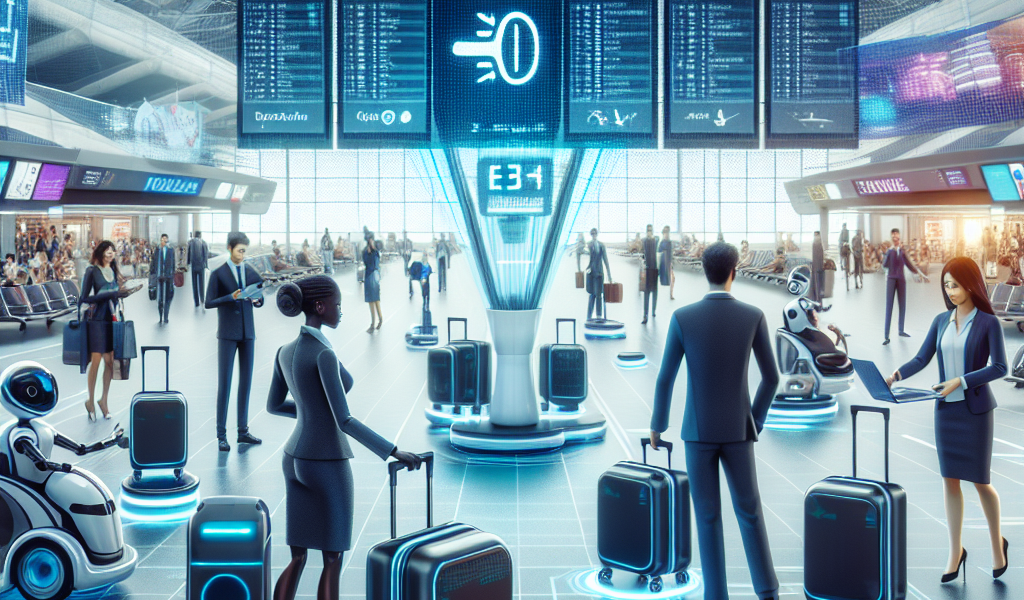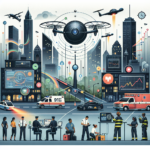-
Table of Contents
“Revolutionizing Journeys: The Digital Transformation of Travel”
Introduction

The travel industry is undergoing a profound transformation driven by rapid advancements in technology. From the way travelers plan and book their trips to the experiences they have while on the move, technology is reshaping every aspect of the journey. Innovations such as artificial intelligence, mobile applications, virtual reality, and blockchain are enhancing convenience, personalization, and security for travelers. Smart airports, digital boarding passes, and automated customer service are streamlining the travel process, while data analytics and machine learning are enabling companies to offer tailored recommendations and dynamic pricing. Additionally, the rise of the sharing economy, facilitated by platforms like Airbnb and Uber, is providing travelers with more options and flexibility. As technology continues to evolve, it promises to make travel more efficient, enjoyable, and accessible, heralding a new era of exploration and connectivity.
The Rise Of AI-Powered Travel Assistants
In recent years, the travel industry has undergone a significant transformation, largely driven by advancements in technology. Among these innovations, AI-powered travel assistants have emerged as a game-changer, revolutionizing the way people plan, book, and experience their journeys. These intelligent systems are not only making travel more convenient but also more personalized, catering to the unique preferences and needs of each traveler.
One of the most notable impacts of AI-powered travel assistants is their ability to streamline the booking process. Gone are the days when travelers had to spend hours scouring multiple websites for the best deals on flights, hotels, and car rentals. Today, AI algorithms can analyze vast amounts of data in seconds, presenting users with tailored recommendations that match their budget and preferences. This not only saves time but also ensures that travelers get the best possible value for their money.
Moreover, AI-powered travel assistants are adept at providing real-time updates and support. For instance, if a flight is delayed or canceled, these systems can automatically rebook passengers on the next available flight, often before the traveler is even aware of the disruption. This level of efficiency and responsiveness can significantly reduce the stress and inconvenience associated with travel disruptions, allowing travelers to focus on enjoying their trip.
In addition to logistical support, AI-powered travel assistants excel in offering personalized recommendations for activities, dining, and sightseeing. By analyzing a traveler’s past behavior and preferences, these systems can suggest experiences that are likely to be of interest. For example, a traveler who frequently visits art museums might receive recommendations for lesser-known galleries in their destination city. This level of personalization enhances the travel experience, making it more enriching and memorable.
Furthermore, AI-powered travel assistants are breaking down language barriers, making it easier for travelers to navigate foreign countries. Advanced language processing capabilities enable these systems to provide real-time translation services, allowing travelers to communicate more effectively with locals. This not only enhances the overall travel experience but also fosters a deeper connection with the destination’s culture and people.
While the benefits of AI-powered travel assistants are undeniable, it is important to acknowledge the potential challenges and ethical considerations associated with their use. Privacy concerns are paramount, as these systems often require access to personal data to function effectively. Ensuring that this data is handled securely and transparently is crucial to maintaining traveler trust. Additionally, there is the risk of over-reliance on technology, which could diminish the spontaneity and serendipity that are often the hallmarks of travel.
Despite these challenges, the rise of AI-powered travel assistants represents a significant step forward for the travel industry. By leveraging the power of artificial intelligence, these systems are making travel more accessible, efficient, and enjoyable for millions of people around the world. As technology continues to evolve, it is likely that AI-powered travel assistants will become even more sophisticated, offering an even greater level of support and personalization.
In conclusion, the advent of AI-powered travel assistants is transforming the travel industry in profound ways. From streamlining the booking process to providing real-time support and personalized recommendations, these intelligent systems are enhancing every aspect of the travel experience. While it is important to address the associated challenges, the potential benefits of AI-powered travel assistants are immense, promising a future where travel is more seamless and enjoyable than ever before.
Blockchain Technology In Travel Security And Transactions
Blockchain technology, once a concept confined to the realm of cryptocurrencies, is now making significant inroads into various industries, including travel. This innovative technology is transforming the travel industry by enhancing security and streamlining transactions, offering a new level of trust and efficiency for both travelers and service providers. As the world becomes increasingly interconnected, the need for secure and transparent systems has never been more critical, and blockchain is stepping up to meet this demand.
One of the most compelling applications of blockchain in the travel industry is in the realm of security. With the rise of digital transactions and the sharing of personal information online, travelers are more vulnerable than ever to cyber threats. Blockchain’s decentralized nature provides a robust solution to this problem. By distributing data across a network of computers, blockchain makes it nearly impossible for hackers to alter or steal information. This enhanced security is particularly beneficial for storing sensitive data such as passports, visas, and personal identification numbers. Travelers can rest assured that their information is safe, reducing the anxiety that often accompanies international travel.
Moreover, blockchain technology is revolutionizing the way transactions are conducted in the travel industry. Traditional payment methods, often fraught with high fees and lengthy processing times, are being replaced by blockchain-based transactions. These transactions are not only faster but also more cost-effective, as they eliminate the need for intermediaries such as banks. For instance, a traveler booking a hotel room or a flight can complete the transaction almost instantaneously, with lower fees and greater transparency. This efficiency is a boon for both travelers and service providers, fostering a more seamless and enjoyable travel experience.
In addition to enhancing security and streamlining transactions, blockchain is also improving the overall transparency of the travel industry. One of the perennial issues faced by travelers is the lack of transparency in pricing and availability. Blockchain can address this by providing a decentralized ledger that records all transactions and updates in real-time. This means that travelers can have access to accurate and up-to-date information about prices, availability, and even reviews. Such transparency not only empowers travelers to make informed decisions but also holds service providers accountable, fostering a more trustworthy and reliable industry.
Furthermore, blockchain technology is facilitating the creation of decentralized travel platforms. These platforms operate without a central authority, allowing for peer-to-peer transactions and interactions. For example, a decentralized travel booking platform can connect travelers directly with service providers, bypassing traditional intermediaries. This not only reduces costs but also enhances the overall user experience by providing more personalized and flexible options. Travelers can enjoy a more tailored experience, while service providers can reach a broader audience without the constraints imposed by traditional platforms.
As blockchain technology continues to evolve, its potential applications in the travel industry are expanding. From enhancing security and streamlining transactions to improving transparency and fostering decentralized platforms, blockchain is poised to revolutionize the way we travel. While challenges remain, such as regulatory hurdles and the need for widespread adoption, the benefits of blockchain are undeniable. As more stakeholders in the travel industry recognize and embrace this technology, we can look forward to a future where travel is not only more secure and efficient but also more transparent and enjoyable. In this rapidly changing landscape, blockchain stands out as a beacon of innovation, promising to transform the travel industry for the better.
Virtual Reality Tours: Exploring Destinations Before You Travel
In an era where technology is reshaping every facet of our lives, the travel industry is no exception. One of the most groundbreaking advancements in this sector is the advent of virtual reality (VR) tours, which allow potential travelers to explore destinations before they even book a ticket. This innovation is not just a fleeting trend; it is a transformative tool that is changing how we plan and experience travel.
Virtual reality tours offer an immersive experience that goes beyond traditional photographs and videos. By donning a VR headset, users can be transported to the bustling streets of Tokyo, the serene beaches of the Maldives, or the historic ruins of Rome. This level of immersion provides a sense of presence that static images simply cannot match. As a result, travelers can make more informed decisions about their destinations, accommodations, and activities.
Moreover, VR tours are particularly beneficial for those who may have reservations about traveling to unfamiliar places. For individuals with anxiety or mobility issues, the ability to virtually explore a destination can alleviate some of the uncertainties and fears associated with travel. This technology offers a sense of reassurance, allowing them to experience the environment and amenities beforehand, thus making the prospect of travel less daunting.
In addition to easing anxieties, virtual reality tours also serve as a powerful marketing tool for the travel industry. Travel agencies, hotels, and tour operators can showcase their offerings in a more dynamic and engaging way. Instead of relying solely on brochures or websites, they can provide potential customers with a virtual taste of what awaits them. This not only enhances customer engagement but also increases the likelihood of bookings.
Furthermore, VR tours are an excellent educational resource. Schools and universities can use them to offer students a virtual field trip to historical sites, museums, and natural wonders around the world. This not only enriches the learning experience but also fosters a greater appreciation for different cultures and environments. For many students, these virtual excursions may be the closest they get to international travel, making the experience all the more valuable.
However, it is important to acknowledge that virtual reality tours are not a substitute for actual travel. The sensory experiences of tasting local cuisine, feeling the warmth of the sun on your skin, or hearing the sounds of a foreign city cannot be fully replicated in a virtual environment. Nonetheless, VR tours serve as a complementary tool that enhances the overall travel experience. They provide a preliminary glimpse that can inspire and inform future journeys.
As the technology continues to evolve, we can expect even more sophisticated and realistic virtual reality tours. Advances in haptic feedback, for instance, could allow users to feel textures and temperatures, further enhancing the sense of immersion. Additionally, the integration of artificial intelligence could offer personalized virtual tours tailored to individual preferences and interests.
In conclusion, virtual reality tours are revolutionizing the travel industry by offering a new way to explore and experience destinations. They provide a valuable resource for travelers, marketers, and educators alike, making travel more accessible and engaging. While they cannot replace the unique experiences of actual travel, they undoubtedly enrich the journey from the moment we start planning. As we continue to embrace and develop this technology, the possibilities for virtual exploration are boundless, promising an exciting future for the travel industry.
Conclusion
Tech is revolutionizing the travel industry by enhancing customer experiences, streamlining operations, and introducing innovative solutions. From AI-driven personalized recommendations and seamless booking processes to virtual reality tours and smart luggage, technology is making travel more efficient, enjoyable, and accessible. The integration of big data analytics, IoT, and mobile applications is enabling real-time updates and personalized services, while blockchain is improving security and transparency. Overall, technology is not only transforming how we travel but also setting new standards for convenience, safety, and customer satisfaction in the industry.





